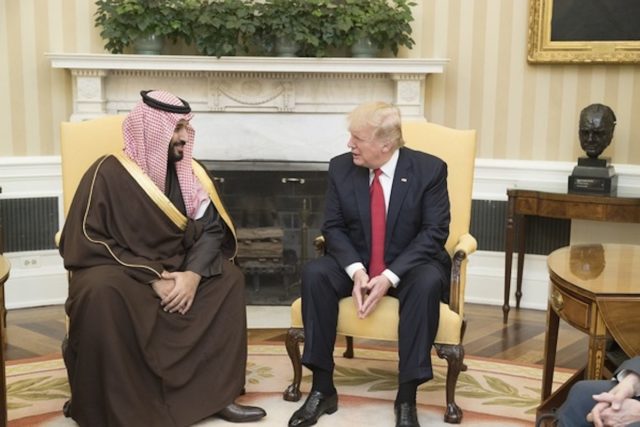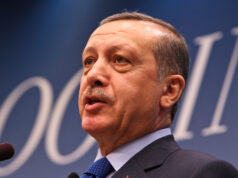Deflection. That’s when someone tries to turn aside responsibility and shift it to someone/something else. Today’s example is the rampage by the White House and Democrats against Saudi Arabia, accusing it of cutting oil production because it is in bed with Russia against American interests in Ukraine.
CNN correspondent Manu Raju tweeted on Wednesday [Rep.] “Ro Khanna and [Sen.] Dan Blumenthal are calling for bill in lame-duck halting arm sales for a year. Calls for NOPEC legislation. And Durbin this AM: ‘I don’t see any reason to arm them now if they believe their future is linked to Vladimir Putin in any way.’”
National Security spokesman John Kirby tried deflection as he announced the White House’s displeasure: “The Saudi Foreign Ministry can try to spin or deflect… (but) The Saudis conveyed to us… their intention to reduce oil production, which they knew would increase Russian revenues and blunt the effectiveness of sanctions… They could easily wait for the next OPEC meeting… we are reevaluating our relationship with Saudi Arabia… continue to look for signs about where they stand in combatting Russian aggression.”
The reason the White House wanted the cuts to wait until the next OPEC meeting may have something to do with America’s mid-term election. Why the Saudis would care about that is unclear. The fact is that countries make economic and security decisions based on their own interests and their peoples’ interests.
America’s European allies certainly do — just last week, Reuters reported that the EU remains the biggest market for Russian oil, according to the IAEA. India and China are increasing their purchases from Russia, according to the CEO of Gazprom Neft. And, while demanding that Saudi Arabia produce more, the Biden administration is considering reinstating a ban on exports of crude oil as gasoline prices rise in the U.S. Reducing oil exports to our allies would only make others look elsewhere, including to Russia, as winter approaches and their stocks remain low.
The actual cause of the Saudi decision to cut production in the face of Biden administration begging for an increase is Biden administration policy.
Even on the campaign trail, Joe Biden said he would make Saudi Arabia a “pariah” over the case of Jamal Khashoggi. Arriving in office, his policies have been a huge win for Iran and a huge loss for countries in Iran’s sights: traditional allies in the Gulf including Saudi Arabia plus Israel, as well as Iraq, Egypt, Jordan, Syria, Yemen, and Kuwait.
First, the administration removed the terrorist designation from Iranian-armed and trained Houthi rebels in Yemen, who have since increased their attacks on civilian and industrial sites in Saudi Arabia and the United Arab Emirates.
In September 2021, the administration removed most of the U.S.-operated Patriot missile batteries from the Persian Gulf, Saudi Arabia, Iraq, Jordan, and Kuwait, suggesting those countries could defend themselves. Concurrently, however, Biden announced a freeze on missile sales to Saudi Arabia (the missiles that were supposed to go in the Patriot system that the Saudis were supposed to use to defend themselves in our absence).
In November 2021, Houthis stormed the U.S. embassy in Sanaa, holding local staff hostage. This past February there was an attack aimed at Dubai during the visit of Israel’s President Isaac Herzog.
Another early move with longer-term consequences was a little-noticed agreement with South Korea in March 2021 to permit the unfreezing of up to a billion dollars in Iranian assets that were restricted after Iran hijacked a South Korean ship. The money paid Iran’s UN arrears and restored its voting rights — resulting in Iran joining the U.N. committee on women’s rights. More money has followed, paid directly to Iran.
Along the way, America castigated Saudi Arabia for its human-rights policies — not entirely undeservedly, but the absence of focus on Iran’s human rights violations was a signal to Iran, which had the highest known number of executions in 2021. (China is presumed to have the most by thousands, but there are no official numbers. Meanwhile, China buys Iranian oil under American sanction waivers.)
In the Spring of 2022, the White House suggested it might lift the terror designation on the Iran’s Revolutionary Guard Corps (IRGC) in exchange for a pledge “specifically not to target Americans in the Middle East,” according to a diplomatic source as reported in the Jerusalem Post. It didn’t happen, mostly because more than 600 Gold Star American families, related to soldiers killed in Iraq by the IRGC, protested.
In July, President Biden went to Saudi Arabia and had a “fist bump” with Crown Prince Mohammed Bin Sultan (MbS) in July. After a wave of criticism from his domestic allies, Biden retreated. “I didn’t come here to meet with the crown prince. I came here to meet with the GCC and nine nations, to deal with the security and the needs of the free world, and particularly the United States.”
Great way to make MbS consider your request seriously in October.
The Ukraine war won’t be won or lost by the price of OPEC+ oil. And trying to deflect responsibility for the arc of the war onto oil production and exports of a single producer, Saudi Arabia, won’t do it either.






